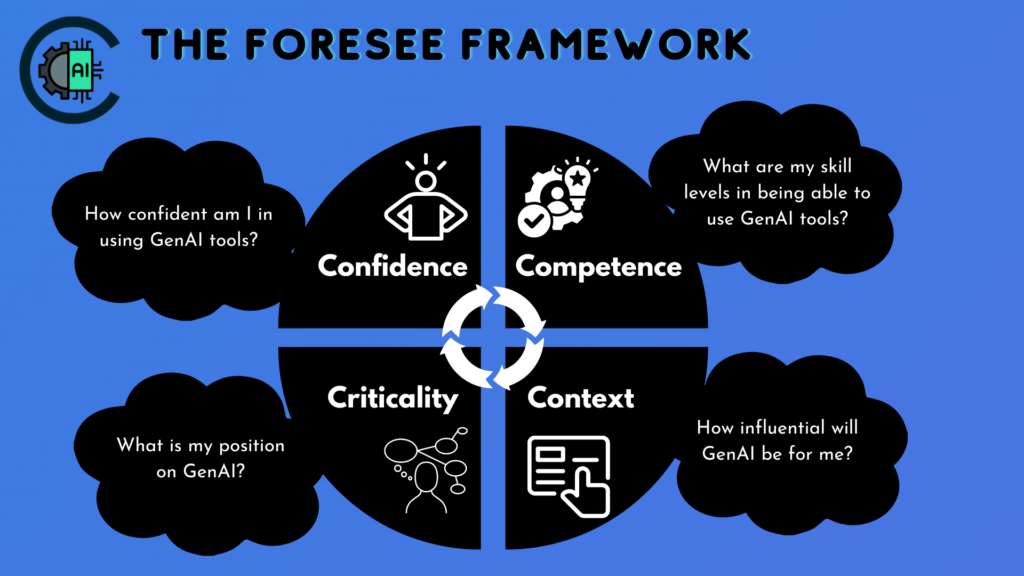
- Why does the Forsee Framework focus on the domains of confidence, competence, criticality, and context?
We believe each of these aspects has equal and critical importance in how a person interacts, leverages, and can be impacted by generative AI tools. Consider these examples:
Confidence: refers to strength of belief but does not necessarily specify what the certainty is about, be it positive or negative. This is different from self-efficacy alone which is about having the positive belief that you have the capacity and the skills to achieve a task. So confidence can be both broadly interpreted or task variant and specific. According to self-efficacy theory your belief and confidence affect how you either take on or avoid perceived challenge1. This is relevant as having low confidence in using generative AI might mean you do not experiment or enjoy trying new tools and features.
Competence: encompasses a combination of knowledge, expertise, skills, and experience, relevant to generative AI usage. We believe it is important to reflect on your competence in using AI tools for several reasons:
- Personal & professional development by promoting self-awareness.
- Learning and aiding your decision-making through making informed decisions about when and how to use AI tools.
- A way to fact check your current perceived confidence in using generative AI, especially evidence of ‘exceptions’. Confidence and competence interact in well-known psychological examples of cognitive bias such as ‘Imposter Syndrome’ and the ‘Dunning Kruger Effect’.
Criticality: embraces the critical stance1 as an approach and attitude for learning and reflection. Criticality is therefore about being able to willingly challenge and examine our own reflexive position towards generative AI, be it our feelings, reaction, and motives. In the Forsee Framework we are not telling you what to think about AI but to encourage openness towards how you think and why.
Context: we acknowledge and accept the uniqueness, complexity and nuance in people’s personal, social and work lives. Context is important as we want you to consider the introspective and the extrospective in considering how generative AI impacts you both now and the potential of your future. The connection to criticality is also important. How limited or significant you see AI’s influence is undoubtedly altered by how willing you are to examine a future that is volatile, uncertain, complex, and ambiguous (VUCA).
You can download the full Foresee Framework user guide which also includes a copy of the My GenAI Companion Quiz.
2. Is the tool designed to make you better at using generative AI tools?
The Forsee Framework has no training or learning function directly related to improving your competence and has not been designed to be a digital literacy teaching tool. Nor is it advocating you must develop each domain to a predefined scale of ability e.g. you must become an advanced and embracing user of generative AI. Fundamentally the Forsee Framework aims to act as an initiator to reflective thought and a critical stance, enabling you to consider aspects of strength and development in your own context towards generative AI. In this sense, although not by design it may indirectly contribute to you taking action that could lead to increased confidence and competence in starting to use generative AI tools.
3. What are the theoretical underpinnings of the Forsee Framework as a Personal Development tool?
We want you to use the Forsee Framework definitions and questions to help you examine and test your assumptions, thinking and mental models behind your relationship with generative AI.
Argyris and Schön (1978)3 proposed a fresh perspective on reflection which is valuable to the ideals of a reflective thought process: This was the idea of single-loop and double-loop learning.
In single-loop learning imagine you are adjusting your actions based on the gap between what you expected and what actually happened. A generative AI example of this could be to consider to try a different prompt when you didn’t quite get the answer you were hoping for.
However, remember with using the Forsee Framework we want you to try and take a ‘critical stance and employ an approach called double-loop learning which goes deeper than single loop. Instead of just tweaking actions, you start questioning the very foundations—the values, assumptions, and policies that shaped those actions. For generative AI this could include questions such as: What specific evidence or experiences contribute to my confidence with AI? Am I making any assumptions in considering how I feel about AI?”.
4. Why does the questionnaire only use two scales?
The value is in the reflexive process and so we decided to use two scales as the simplest way to introduce two oppositional standpoints relevant to generative AI usage. We want you to create the vision of what is in between the scales through critical reflection rather than an inaccurate or complex set of reference points for you to place yourself in. Fundamentally, as the Forsee Framework is not a literacy framework, we are much less concerned about ability and much more interested in critical thought.
5. What is my My GenAI Companion all about?
The value of metaphors (in our case animal metaphors) are well established as ‘cognitive’ tools through which we can construct meaning and understanding as representations of human qualities. As we intend and hope the Forsee Framework is useful for a wide age range we also like the idea of introducing fun and making our simple Forsee typology memorable when you take the My GenAI Companion quiz.
References